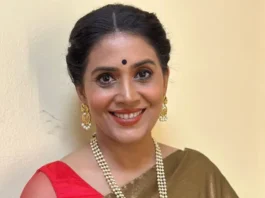

Sachin Pilgaonkar is an Indian actor, director, producer, writer, and singer of Hindi and Marathi films. Sachin Pilgaonkar is also known by his screen name, Sachin. Sachin Pilgaonkar directed and starred in a number of late 1980s and early 1990s Marathi films. Among the many honors he has won are two National Film Awards and two Marathi Filmfare Awards.
Read Also – Actress Neha Rana Biography, Wiki
Sachin Pilgaonkar began his career in the Marathi film industry as a child in Ha Majha Marg Ekla (1962). He worked as a child artist in about 65 films before transitioning to adult roles. As a lead actor, he became well-known in India and appeared in highly successful films such as Geet Gaata Chal (1975), Balika Badhu (1976), Ankhiyon Ke Jharokhon Se (1978), and Nadiya Ke Paar (1982). In addition to acting, producing, and directing popular comic shows on Indian television, such as Tu Tu Main Main (2000) and Kadvee Khatti Meethi, he has worked in Hindi, Marathi, Kannada, and Bhojpuri cinema.
Along with directing several successful Marathi films, he also produced the biggest box office smash, Navri Mile Navryala (1984), which began with Mai Baap (1982). At the box office, Ashi Hi Banwa Banwi (1988) and Aamchya Sarkhe Aamhich (1990) were huge hits. Hits included Navra Mazha Navsacha (2004). Alongside Kannada actor Vishnuvardhan, Sachin debuted in the Kannada cinema industry in 2007 with the film Ekadantha, a remake of his own film Navra Mazha Navsacha.
Sachin Pilgaonkar Childhood And Individual Life
A Pilagaon, Goa-based Marathi family gave birth to Sachin in Mumbai. In addition to being a film producer, his father Sharad Pilgaonkar ran a printing company in Mumbai.
Actress Supriya Pilgaonkar (née Sabnis), whom he initially directed for his first Marathi film, Navri Mile Navryala (1984), is his wife. The two went on to become a popular duo in Marathi cinema. Shriya Pilgaonkar is the daughter of the couple.
Sachin Pilgaonkar Career
Movies
Pilgaonkar began his career in movies as a young artist. The arrangements for him to appear in Madhavrao Shinde’s 1961 film Soonbai fell through. At the age of four, he was then selected for Raja Paranjape’s 1962 Marathi film, Ha Maza Marg Ekla (transl., This is my own singular route), for which he was awarded the National Award.Dr. Sarvepalli Radhakrishnan presented him with the honor .
He made his acting debut as a kid in the Hrishikesh Mukherjee-directed Majhli Didi, starring Dharmendra and Meena Kumari. He has starred in several well-known movies like Jewel Thief, Chanda Aur Bijli, Brahmachari, and Mela. He collaborated closely with fellow child actor Naeem Sayyed, also known as Junior Mehmood, with whom he had his feature debut at the age of eight in the Shammi Kapoor film Brahmachari. Together, they made fifteen films as young artists.
Read Also – Actor Arjun Aneja Biography, Wiki
For a brief period, he transitioned to performing lead roles in Rajshri Productions’ Geet Gaata Chal, where he was paired with Sarika. Their surprising success in the movie made them the leading actors in other movies. The two went on to collaborate on projects like Rajshri Productions, Zid, College Girl, and Nadiya Ke Paar.
Sachin Pilgaonkar returned to supporting parts with Trishul, appearing in popular films like Sholay, Avtaar, Sur Sangam, and Satte Pe Satta,. However, as the demand for roles declined, he turned to directing, creating TV serials and Marathi films. He is a well renowned Marathi film director. He directed Aisi Bhi Kya Jaldi Hai in 1996 and Subhash Ghai’s Prem Deewane in 1992. The 2011 film Jaana Pehchana, directed by him and starring him, is a follow-up to Sachin’s previous hit movie Ankhiyon Ke Jharokhon Se.
He played Khasaheb Aftab Hussain in the 2015 movie Katyar Kaljat Ghusli, which was based on the play of the same name . He had to speak exclusively Urdu for the role, which he was accustomed to speaking because Meena Kumari had taught him the language when they were both working on Majhli Didi in 1966. He also gives gratitude to Hrishikesh Mukherjee for teaching him how to edit films and Sanjeev Kumar for helping him practice challenging situations.
In the 1980s and 1990s, Sachin, Laxmikant Berde, Ashok Saraf, and Mahesh Kothare formed a popular foursome and starred in a number of popular Marathi films.
On TV
In the 1990s, Pilgaonkar became involved in Indian television when he directed the Hindi comedy series Tu Tu Main Main on the Star Plus Hindi National channel. The sitcom featured his wife Supriya and Reema Lagoo. In addition, he directed a program called Rin 1 2 3 on the Hindi National channel DD Metro, which aired Bollywood movie parodies. He also directed the sitcom Hadh Kar Di, which starred Dara Singh and was successful at first until being canceled.
Meanwhile, he was anchoring Marathi film award ceremonies, numerous events, and Hindi music shows like Chalti Ka Naam Antakshari on Star Plus. He and his spouse Supriya defeated nine other celebrity competitor pairs to win the Hindi dancing reality show Nach Baliye in 2006, taking home a prize of Rs. 4 million {roughly $100,000}. He began a new dance-based Zee Marathi program called Eka Peksha Ek in late 2007, searching all over the state of Maharashtra for untapped talent.
Sachin Pilgaonkar participated in Chhote Miyan (2009), a reality comedic talent program on Colors TV, as a judge.
Direction
Since the 1980s, Pilgaonkar has also started directing Marathi movies. His first feature film, Mai Baap (1982), was critically acclaimed. However, it wasn’t until 1984’s Navri Mile Navryala—which also starred Supriya Pilgaonkar, his future wife—that he began to experience financial success. Additional movies such as Maza Pati Karodpati (1988) and Gammat Jammat (1987) solidified his position in the Marathi cinema industry. In addition, he experienced great success in the 1988 film Ashi Hi Banwa Banwi, which starred both Ashok Saraf and Laxmikant Berde, the two current Marathi film industry giants.
Sachin became known as a hitmaker after the film became an overwhelming hit. With the next two films, he veered off into experimental cinema, but he returned to comedy with Aamchya Sarkhe Aamhich (1990), which turned out to be another huge blockbuster. In the Supriya Pilgaonkar-produced 2018 film Ashi Hi Aashiqui, he directed Berde’s son Abhinay Berde. The sequel to 2004’s Navra Maza Navsacha, which starring Swapnil Joshi, Hemal Ingle, Supriya Pilgaonkar, himself, and Ashok Saraf in key parts, was produced and directed by him in 2024.
Sachin Pilgaonkar Other Activities
Sachin penned his autobiography, Hach Maza Marg, in 2017 to commemorate the end of his 50-year cinema career. Sachin penned a ghazal under the pseudonym Shafaq for renowned director Govind Nihalani’s 2017 Marathi directorial debut, Ti Ani Titar. The song is named “Badal jo ghir ke aaye”.
The song Amchi Mumbai Changali Mumbai, which Sachin featured in in 2018, received a lot of negative feedback from his followers.
About Latturam – latturam.com is a platform to know some facts about nature, history, health, environment and our lifestyle.
Read Also – Actor Swapnil Joshi Biography, Wiki



